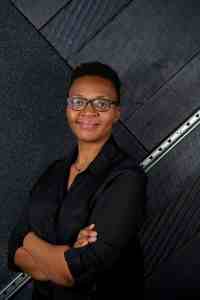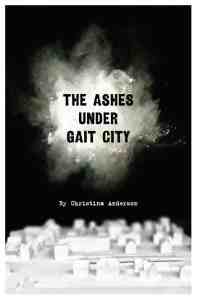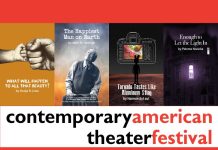This Special Edition of The Playwright’s Playground continues The Playmaker Series: CATF 2014. In a series of in depth conversations, I speak with the artistic teams associated with the plays at this year’s Contemporary American Theater Festival. Playwrights and the Directors share revealing behind the scene insights about their inspirations and the development of their new plays.
It’s always refreshing and reaffirming to speak with artists who are not only passionate about the work they do, but are open about sharing their creative process and motivations.
The World Premiere of Christina Anderson’s new play The Ashes Under Gait City debuted this month at The Contemporary Theatre Festival in Shepherdstown, West Virginia.
American Theatre Magazine selected Anderson as one of the fifteen up-and-coming artists “whose work will be transforming America’s stages for decades to come.” This year’s The Kilroy’s List results also recently named Christina’s play Man in Love as one of the top 46 most recommended new female-authored plays. Born and raised in Kansas City, KS, Christina obtained her B.A. from Brown University and an M.F.A. from the Yale School of Drama’s Playwriting Program. She’s a Resident Playwright with The New Dramatists since 2012 and a member (past Core Writer) of The Playwrights’ Center.
Her plays include: Drip, Inked Baby, Blacktop Sky, Man in Love, Good Goods, Hollow Roots, pen/man/ship, and The Ashes Under Gait City.
Awards and honors include 2011/12 Playwright-in-Residence at Magic Theater (National New Play Network), two PONY nominations, 2011 Wourzell Prize Finalist (University of Vienna), National Playwrights’ Conference residency at the O’Neill, Schwarzman Legacy Scholarship awarded by Paula Vogel, two Susan Smith Blackburn nominations, Lorraine Hansberry Award (American College Theater Festival), Van Lier Playwriting Fellowship (New Dramatists), Wasserstein Prize nomination (Dramatists Guild), and Lucille Lortel Fellowship (Brown University).
______

Sydney-Chanele: Why do you write? More specifically why do you write plays?
Christina: I’ve always been interested in words and language even before I was able to write. When I was a kid, I would scribble stuff on a paper and envision it was a story, and then make my mother listen to me read this story to her. So I’ve always had a relationship with language, telling stories, storytelling. I guess it’s organic to me. It’s connected to me in the same way my hands are connected to me, or my elbows or knees . . . It’s like breathing for me – the act of writing.
I got introduced to playwriting when I was a freshman in high school. It just became this thing I was connected with. I was really interested in language as sound as well as storytelling – creating word via language. I also love the collaboration working with actors and directors. When you see good actors do good work, it’s like nothing else. So playwriting brings together all of my favorite things – performance and music. I think language can be musical.
It’s like this lovely stew of awesomeness. The act of writing, storytelling, thinking, doing research, and creating play worlds. The room here with the cast at CATF has been really incredible, because I came in with a draft of the play and then re-wrote it. I mean everything – in a week! And the actors were like, OK. So those are the things I love about it – that collaboration.
Since working with the actors during the rehearsal process, what has surprised you about The Ashes Under Gait City?
I think working with CATF in general has been amazing. I knew it was a big play but I was only using five characters to tell it. Theresa Davis, the dramaturg, has been great and has helped me a lot just being able to feel that I was still in control over the story. The first thing I told Teresa is that I believe this can be a good play it’s just a matter of putting all the pieces together. There are a lot of historical things I put in plus keeping the tension alive and keeping the character arcs strong. So the surprising thing to me is that it all came together. I feel like it’s a pretty solid play and there are still some things that I have to work on. But I’m really excited because I always believed in this play.
How did you come up with the concept and the title?
Well, it originally started with a commission at Portland Playhouse. I had never been to Portland – I had never been anywhere in the Pacific Northwest – and I had only met the Artistic Director who had come to see my thesis production at Yale. He offered me a commission and they brought me out to Portland to come see the city. I asked, what do you want me to write about – do you want me to write about Portland? They said whatever you want to do.
I usually tell Black American stories, and I usually do the Midwest, Southeast coast and I never had considered the Pacific Northwest. So I started doing research and found out about exclusionary laws that were enacted in Oregon in 1844, which essentially banned black people from living in Oregon. The laws were on the books, I think until 1927, and that just blew my mind. The research became so interesting to me, and there was this weird thing where they tried to chase the black people out. But a lot of them had homes. So then it was like, ok you can stay here but new people can’t come. Then wealthy white people would come and they said I’m not leaving my slaves behind. So then it was like, ok the slaves can stay. So historically, the population never really hit zero basically because of the white allowance to keep the population from hitting zero.
I think there are a lot of present day assumptions that there are not a lot of black people in the state of Washington or Oregon. I was fascinated by the choice that was made in 1844, and the present day stereotypes that have lived through centuries. More research with Washington and Oregon lead to the Sundown Laws, black people couldn’t be on the streets, and that was enacted until the 70’s and even the 80’s in some states.
The thought of race and city came about, and I made up the city (Gait City) from scratch. It’s present day, 2014. You know how Atlanta has become a black Mecca? I thought it would be interesting if there was this black guru who wanted to turn a city in Oregon into a black Mecca because that’s not something we naturally put together. There are a lot of biblical references – floods and fire – and that became the narrative of The Ashes Under Gait City. So that’s how it came to be.
Who is Simone the Believer and how is The Ashes Under Gait City created in this play? How long ago did this project begin and how many re-writes were involved?
This play is about Simone the Believer. She is a black woman who is an online guru, and she has huge online following. People hire her to believe in them when they’re insecure and to help with career transitions and she helps them build steps to a better life.
Her mother, a community activist, passes away eight weeks earlier. When going through her mother’s papers after her death, she learns about Gait City after the fire and the black people being displaced. And after further research, Simone takes it upon herself to creating a black Mecca. Over the course of the play she slowly builds a community of people and as a group they devise a plan to bring more people to the City. And this is where I usually say, but you have to see the play to find out what happens.
This started in Portland two years ago and this is probably the fifth draft. No, it’s the sixth.
So it’s a remix a little bit of historical facts. There is a historical story in the play of a fire leveled the city in 1844 and the survivors rebuilt the City. When they rebuilt the City they kicked out all of the black people. The black people were displaced but the ashes of those who were there are under the City. So the City celebrates this with a Festival of Remembrance, and there is this fringe group of reenactors who celebrate with a foot chase of a black man out of the City. We find all this out in the play in bits and pieces over the course of the story.
I know that a playwright never writes anything without intention. What was your intention behind the use of the spelling the name of the city, G-A-I-T?
Well, that Fringe group that I was talking about that use to chase black men out of the City – that got banned. Now they do a thing called a reenactors loop, where they walk out of the City to a destination where they think the original survivors went to avoid being burned in the fire, and they camp out there. When the City was rebuilt, the survivors had to walk back, so they named it Gait City. So there are a lot of walking references in the play. But I also think it’s great because when you hear it, you think G-A-T-E.
What is the biggest lesson that you learned with this play?
One of the biggest lessons I’ve learned is doing one thing at a time in the re-writing process. I couldn’t do two or three things with each rewrite. It was literally like – what is happening to D in this play? It made me focus, and that was the great thing about working with Theresa. She’d say ‘Let’s look at the City’s history in the play. How do you explain it?’ When Lucie Tiberghien (the Director) came on board, she was really great because then it was about vocabulary, like tracking the vocabulary in the play and the history. So the biggest lesson I learned was when it’s a big play like this – it’s one thing at a time. I can’t get all juggley on it. But the thing I wanted it to be is closer now.
You mentioned earlier the religious and spiritual undertones that play throughout the play. How has spirituality played out in your life and influenced your writing?
Well it’s so funny. If you had talked to mean when I was fifteen, there was no way I would have agreed with you that I would be where I am right now. I think I’ve stayed pretty focused and committed to writing, and in many ways it has become a spiritual thing for me. The times when I stay connected to it and true to it, all these other things fall into place and the universe gives me all of things and these gifts. There is no way I could have gotten into the schools that I got into or met the people, or made the friendships that I made and it was essentially all through this writing practice. Healing processes, creating community, meeting other writers and this grid-like circle that I have in my life now has all been through the act of writing. It’s also very meditative. When I’m in the groove of it – the real act of creating words and language – it’s like nothing else to it. It’s peaceful at times, and even when it’s not peaceful there’s a lot of stillness.
So do you believe in a higher power – in God? Do you feel that writing is your purpose?

A lot of my plays deal with religion. I grew up in a church, in a Baptist Church in Kansas City. I’m fascinated with religion and spirituality, and the way humans engage with it and how it guides our life, how it creates community – how it can break community down. So a lot of my plays kind of wrestle with that.
I think that’s a refreshing viewpoint to hear, especially coming from a contemporary African-American perspective. Was there an experience, a moment, or a play when you said – ‘I’m a professional playwright?’
I don’t know if I still consider myself a professional. I don’t know? I don’t know if there was a moment. I graduated in 2011. (Anderson graduated from Yale University with an M.F.A. and Brown University as an undergrad.) I took time off between Undergrad and Grad. So it was a real decision to go back to school – like three years in between. I had a weird stint where I thought I might go to Law School during that time. When I decided to go to get my M.F.A. it was -‘I’m putting all of my coins in the hat for this one.’ Knock on wood I’ve been able to sustain a life and have everything I do, be connected to writing. Whether I’m teaching, writing, or mentoring – or however the income is coming in – it’s related to writing. I can’t buy any property but I can pay my rent, so I can consider myself professional in that sense.
The role of the artist is to tell the truth. What truth does The Ashes Under Gait City reveal, and what is your truth?
The truth of The Ashes Under Gait City is what are you willing to do to build community. When is a community dangerous? When is it encouraging? My truth is writing and just doing it. Not being afraid to tell the truth. The dark side of the complexity of it, it’s never a simple answer. The truth is a big iceberg, and it’s about chipping away.
______
The Contemporary American Theater Festival (CATF) runs through Aug 3, 2014. Performance tickets to CATF can be purchased through the Theater Festival Box Office, Monday to Friday from 11 am to 5 pm, by calling (800) 999-CATF (2283), or visiting online.
LINKS:
The Playwright’s Playground: ‘The Playmakers – CATF 2014: Interview With Ed Herendeen & Peggy McKowen Who Preview The Season.
The Playwright’s Playground: The Playmakers CATF 2014: Ed Herendeen & Peggy McKowen Discuss the Development of CATF Plays.
The Playwright’s Playground: The Playmakers CATF 2014: An Interview with Playwright Christina Anderson (‘The Ashes Under Gait City’).
Christina Anderson’s website.





